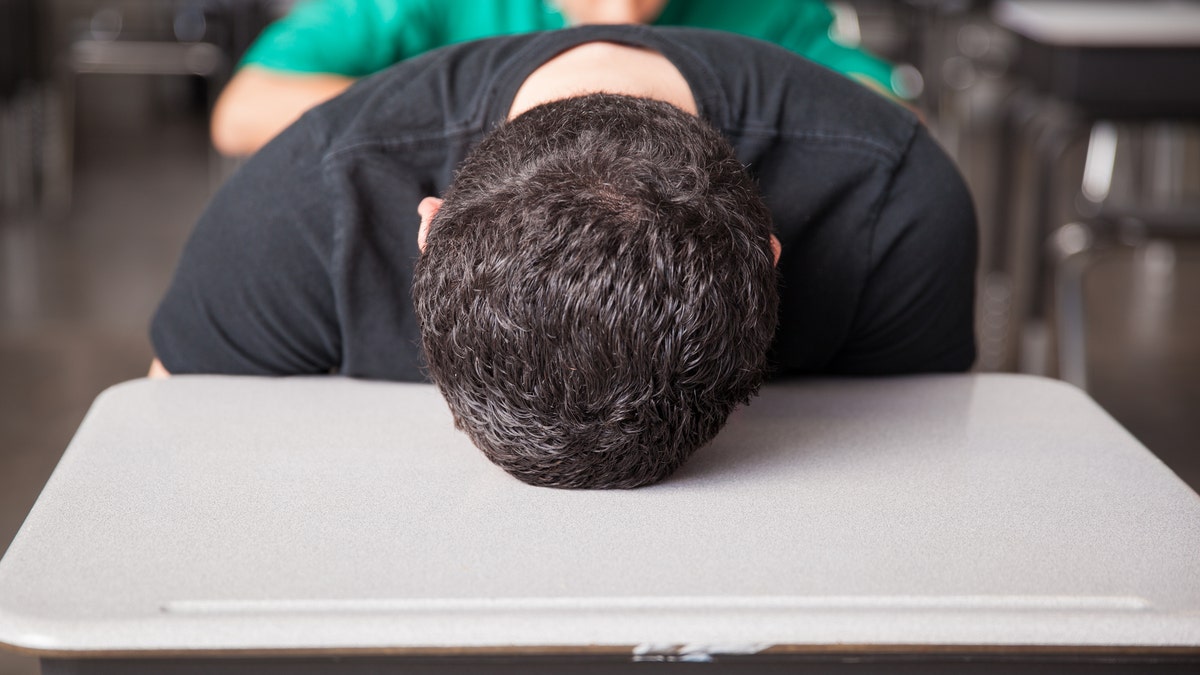
Portrait of a young high school student bored and frustrated with his head down on his desk (iStock)
Teens in Hong Kong whose high school delayed the start of the day by just 15 minutes got to sleep a little longer, were late to school less often and showed better mental health and focus, according to a new study.
Few teens get the suggested 8 to 10 hours of sleep per night and instead, they may try to make up sleep on weekends, which creates an irregular sleep pattern, the researchers write in the journal Sleep Medicine.
Teens in both Hong Kong and the U.S. only get an average of about 7.5 hours of sleep on school days, said lead author Yun Kwok Wing of The Chinese University of Hong Kong.
"Even a modest delay could lead to a number of positive outcomes," Wing told Reuters Health by email, adding that sleep deprivation has been linked to emotional, behavioral and physical health issues for teens.
To explore how delaying school start times might affect teens, the study team collected data on 1,377 students from two Hong Kong high schools.
One of the schools normally started at 7:45 a.m. and let out at 3:40 p.m. and the other normally started at 7:55 a.m. and let out at 3:55 p.m. For the experiment, the first school changed its start time to 8 a.m., compensating for the delay by shaving 15 minutes from lunch hour and retaining the 3:40 p.m. release time. The other school made no changes in its schedule.
Before the study began, researchers evaluated 617 students at the school that agreed to delay its start time and 556 students at the comparison school. All the teens filled out a week-long sleep diary and a small group had their sleep monitored with sensors to validate the sleep diaries. Students also filled out questionnaires asking about their sleeping and waking patterns, their mood and their behaviors, including smoking, drinking and consuming caffeine.
Five months later, the same measurements were performed.
Based on this data, the study team found that students in the delayed-start school spent slightly longer in bed - about an extra 10 minutes in the mornings - compared to the control school's students.
Both groups went to bed slightly later as the study period went on and both continued to feel sleepy during the day and to oversleep on weekends.
But at the end of the study, the students in the delayed-start school had better overall mental health than the students in the comparison school. Their questionnaires and teacher reports indicated improvements in social behavior and relationships with peers, and they had fewer emotional problems than the comparison students.
The later starting students also had fewer behavioral issues, better concentration in class, less dozing off and less tardiness, according to teachers.
Nearly all teachers said they appreciated the later start time and that it improved their schedules and their own sleep, although some worried about possible changes in school dismissal time, class length and after-school activities.
Three quarters of students at the intervention school said that the delayed start time was helpful for sleep, attention and getting to school on time, though a small group had issues with transportation and the shortened lunch period.
"Youth are staying up late due to academic pressures, such as homework, or for social reasons like watching TV or engaging with social media," said Karl Minges, a researcher at Yale University School of Medicine who studies adolescent sleep and school start times.
To compensate for the late bedtimes of teenagers, the American Academy of Pediatrics advocates for schools to begin at 8:30 a.m. or later, said Minges, who was not involved in the study.
"The resounding evidence, including the results of this study, suggests that delaying school start times can help kids get more sleep," Minges said by email.
"Later school start time is an effective intervention in improving adolescent sleep and health," Wing said.







































